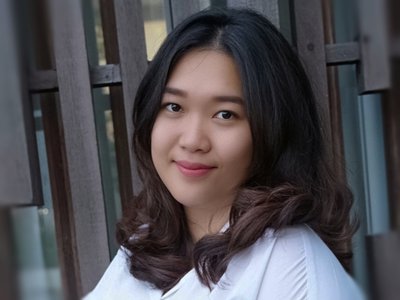11 Apr 2019
MILE Alumni Profiles: Alvita Chen
MILE 14 alumna from Indonesia, Alvita Chen, tells the WTI about her position as Senior Manager for Corporate Affairs at GOJEK, and how the MILE helped her learn the key role of MSMEs in driving sustainable economic development.
Tell us about GOJEK and the work you do in your position.
GOJEK, the biggest consumer tech company in South East Asia, is a tech unicorn that unleashes the potential of MSMEs and empowers informal industry workforces through technology. Originated in Indonesia, the company is growing rapidly across the region and has received global recognition from (among many) the Fortune Change the World List, the UNSGSA and the Gates Foundation. It currently operates in 204 cities across 4 countries. Just last year, GOJEK driver-partners, MSMEs partners and women entrepreneurs have contributed USD 3 Billion to the Indonesian economy.
In my capacity as the Senior Manager for Corporate Affairs, I am driving national communication strategies related to GOJEK’s online transportation services that are core to the company’s continuous innovation. My goal is to help raise public awareness of GOJEK’s vision for social impact including how the technology contributes towards financial inclusion, therefore accelerating the impact itself. In carrying out my tasks, I have witnessed thousands of previously unbanked individuals subscribe themselves and their families to insurances and/or savings products.
I also engage with like-minded institutions that help harness driver partners’ potential to be agents of change in their own communities. In my latest project, I work with Hollaback! Jakarta - a part of Hollaback international movement against harassment at public spaces. Through an engaging setting, driver partners are equipped with the right knowledge of what consists of sexual harassment - a topic still deemed taboo in the country - and how best to be active bystanders. There is also an on-going project with the Indonesian Red Cross that equips partners with first aid training.
What did you do after the MILE that brought you where you are now?
After the MILE, I stayed for some time in Geneva interning with the Permanent Representative of Indonesia, the Sanitary and Phytosanitary Unit of the WTO and the Office of the Executive Director of the ITC. After that, I went back to Jakarta and landed in several cross-functional roles in oil and gas and dairy industries. The ITC internship was a highlight in my early career: It showed how international organizations can connect local players, especially MSMEs and women entrepreneurs into the global economy. The MILE opens doors to internships in international organizations, which is an asset I brought back home. Moreover, the class setting of MILE eased me into various multicultural settings.
How do you think the MILE benefitted you in your career?
The MILE broadened my horizon in many aspects, but the two modules that affected me greatly were the modules on Trade and Development and Trade in Agriculture, where I learned the key role of MSMEs in driving sustainable economic development. I hope that my professional journey can always support that notion.
More Alumni Profiles can be found here.
Further info
MILE 14, Alvita Chen


